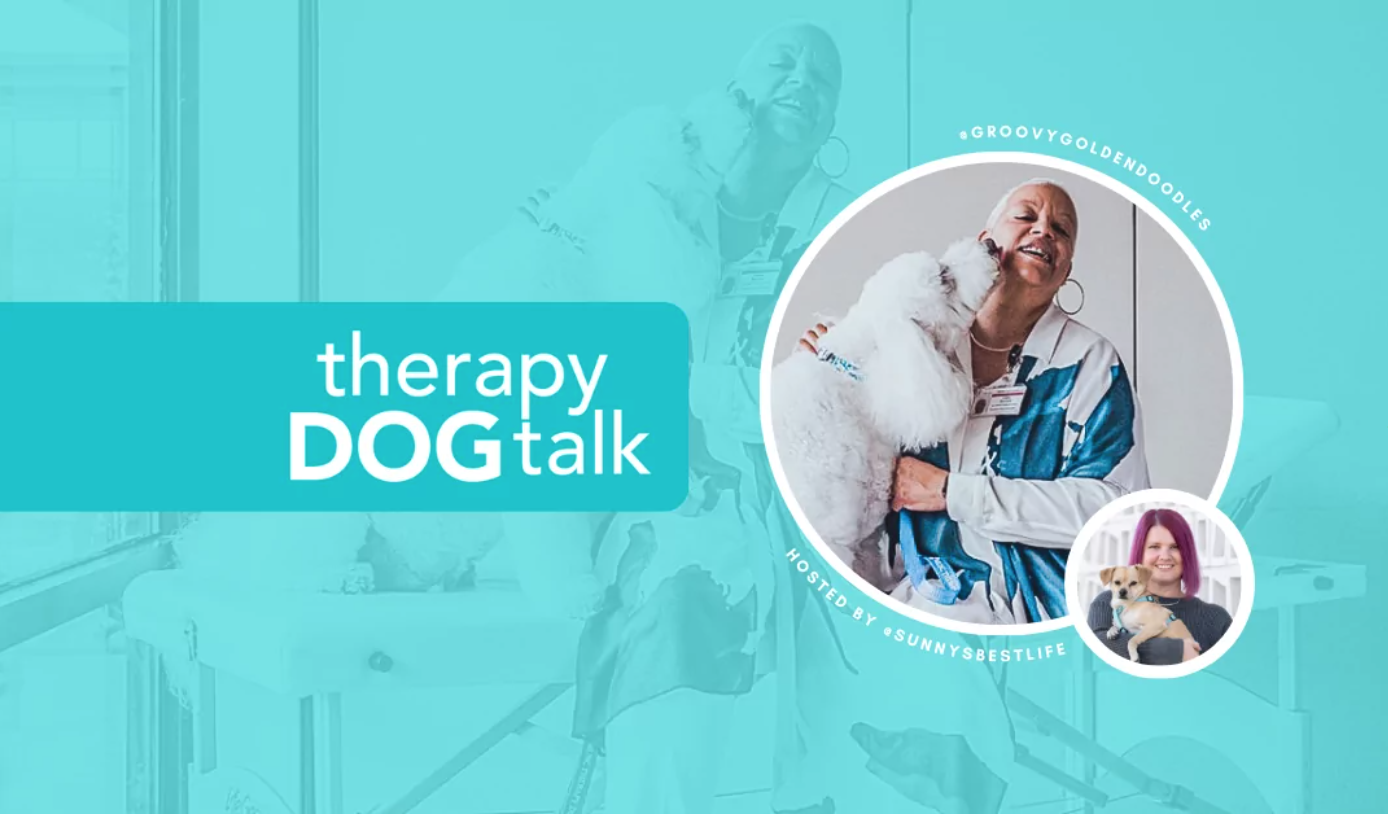When one of the Boys are walking through the hospital with me, people often ask –
What makes a good therapy dog?

If you Googled that question, you would see a variety of definitions/explanations that read like this:
A therapy dog must be friendly, even-tempered, consistent, gentle, confident, comfortable meeting new people, and reliable in unusual environments. Above all, they must love people and truly enjoy being around them while being hugged, kissed and petted.
Canidae
And as a Therapy Dog Program Coordinator for a large University Hospital – I concur.
Therapy dog candidates should also demonstrate enormous patience with those strangers and tolerate other animals. They are generally very intuitive.
A strong connection to their owners is paramount. This becomes visible with their relentless desire to please. I find this to be true with both Harley and Jaxson.
TRAINING –
It goes without saying, what makes a good therapy dog is basic obedience, good manners, a love for people of all ages, and the ability to ignore other dogs.
When asked about training, I always tell people – much depends on the dog.
Some volunteers opt to have their dog participate in formal classes such as CGC (Canine Good Citizen) prior to testing for therapy dog certification.
While this is always a plus, it is not mandatory. Many owners obedience train their pups themselves. Others have sought out assistance from therapy dog training classes.
BREEDS –
There are currently 84 therapy dogs in the program I coordinate.
The State of South Carolina does not have any breed restrictions therefore as a State hospital I cannot restrict a dog based solely on breed.
We have many Retrievers and a variety of Doodles. One Great Pyrenees and a couple of Bernese Mountain Dogs. Six Newfoundlands and two Vizsla’s.
Brodie the Siberian Husky does wonders in Psychiatry and Kia the Malamute howls serenades the staff at the Children’s Outpatient Clinic.
An array of small breeds – excel in the Cancer Centers and Infusion Clinics because they fit/sit nicely in the patients lap. Maltese, Shih Tzu’s, Beagles, Poodles, Havanese, Dachshund, Pomeranians, Yorkshire Terriers, Chihuahuas, and a Rough Collie named “Humphrey Bogart.” #Ikidyounot
We currently have a ten year old Blue Pit Bull Mix – a true gentle giant who volunteers throughout the city of Charleston and has become somewhat of a local celebrity as an ambassador for the breed.
RELATIONSHIPS –
With all the therapy teams I observe and accept into the program, what seems to stand out the most – to me – is the obvious connection at the two ends of the leash.
Harley has been volunteering with both adults and children for more than 8 years now…

Dozens of times he has demonstrated his abilities to “read” people, and understand when I want him to remain with a patient. Especially when that patient needs special attention.
In his therapy career, I have asked Harley to –
- ride the gurney into the pre-op with a child holding onto his tail fearing the unknown.
- lay across a patients chest to sooth a seizure
- remain still in the grips of a woman who’s been told her cancer is terminal
He does these things – – – for me.
Because I understand this, I make sure I remain vigilant as his advocate. I am extremely protective over his hours. I am in charge of his balance.
HOW TO GET STARTED –
If you are interested in becoming a therapy dog volunteer team –
- socialize your puppy or dog to new people, places, objects and surfaces.
- Watch your dog closely and evaluate his/her true temperament.
- Study whether or not he/she really enjoys affection from strangers.
If you are going to train him/her yourself – research and understand the necessary behaviors associated with therapy work, such as –
- look
- leave it
- loose leash walking
- not jumping on people
- no licking whatsoever
The American Kennel Club provides excellent resources on Tips For How To Train A Therapy Dog.
WHAT ABOUT YOU? –
Is becoming a therapy dog handler something you want to do?
It’s a wonderful way to give back to your community, as well as develop an even deeper, purposeful bond with your pup. It will lead to so many new experiences…

Sharing your dog brings an enormous sense of self worth. It has been known to improve ones mental and physical health as well.
I strongly encourage you to join therapy dog organizations, meet like minded people who share this same passion. Find a seasoned handler to mentor you. If you’re open to new adventures, sign up to visit schools, nursing homes, veteran organizations. Search for the “true match” that satisfies both you and your new therapy dog.
If I can help you – in any way – please don’t hesitate to reach out.
The best therapists have paws and a tail ❤️








February 6, 2020
I am I interested becoming a therapy dog handler..I live in East Bay California please direct me where to train
February 17, 2020
Hello Teresa. First you will need to find a therapy dog organization in your area that can evaluate, observe and ultimately certify your dog. I would look online. You want a nationally recognized organization and you want to make sure they will cover you and your dog with the proper insurance. Hope that helps get you started. Feel free to reach out if there is anything else I can help you with. Thanks for stopping by, come visit again soon.
February 7, 2020
Excellent article.
February 17, 2020
Thank you my friend!
February 7, 2020
Hi Cathy! Awesome post. I find this field so interesting! Dash probably could have done this. Lilly no way!! Chester… I don’t know! Maybe? One piece of feedback— many times when I have interacted with a therapy dog the owner is so stand offish and not willing to interact. I find that awkward. I always want to talk “what kind of dog is this?” “how long has he been a therapy dog“. I’m disappointed when the human isn’t very friendly! But I always love the dog!
February 17, 2020
Hey Deirdre – Thanks! I find that to be so odd. Therapy dog volunteers are usually so open, out going and friendly – they love to engage in conversation. We have trading cards that always get the patient (or family members) talking about the information on the dog’s card. They’re great conversationalists!
February 8, 2020
With a little more training I think our beagle Kobi would have made a perfect therapy dog. He was so easy-going, so loving, and a very social dog.
February 21, 2020
Based on your stories Jan K I believe he would have been a great candidate too!
February 9, 2020
What a terrific and diverse program you guys have. How do you guys recruit new dogs into the program? Our hospital program has lost so many dogs over the years and we’re less than half since I first started.
February 17, 2020
I’m actually presenting next month at the Society of Healthcare Volunteer Leadership Conference in New Orleans on recruiting, training and retention (super excited!). The therapy dog teams themselves are my greatest source of recruitment. I try to create an atmosphere that offers diversity in therapy work (AAA and AAI). Training comes from within whether that be palliative care teams, physical/occupational therapy, stroke rehab, etc… Let me know if you want to talk – I’d love to share and help if I can…
February 10, 2020
You’ve got quite the mixed bag of breeds volunteering, don’t you? No Bichons?
Love the name Humphrey Bogart and I adore the the pittie is a local celeb and ambassador to the breed. One of the most misunderstood, discriminated against breeds and I love that he’s just a champion in his field.
🙂
February 17, 2020
Yes, I do! It’s neat to have so many different breeds of dogs. So many people call and ask for a particular breed and very often I am able to surprise them by having their dreams come true. Sydney is extremely special, she’s a beautiful pittie too! XOXO
February 11, 2020
Great Post!
February 17, 2020
Thank you Doodle Dad!
February 11, 2020
Very informative, it can help a lot. Human and pet connections are amazing.
February 17, 2020
Yes – they truly are!